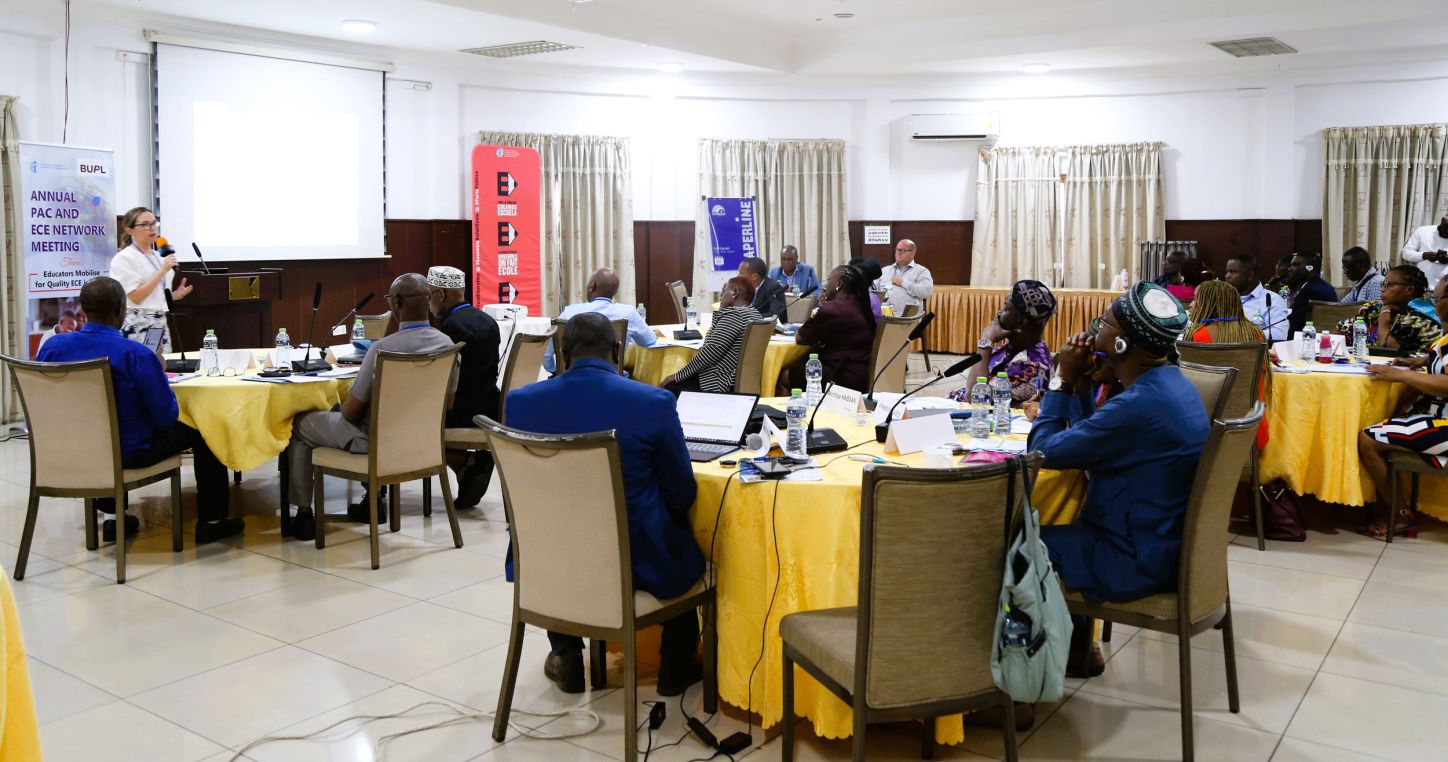Challenges and opportunities in early childhood education in Africa: A network for change
At the first meeting of the Education International (EI) Early Childhood Education (ECE) Network, participants delved into the significant challenges facing early childhood education in Africa, with a particular focus on Ghana. The discussions highlighted issues of access and equality, the lack of robust ECE systems, curriculum and pedagogy challenges, infrastructure and resource limitations, teacher welfare, parental involvement, funding allocation, and poor nutrition among children.
Objectives and expectations of the network
The ECE Network will push governments to address these challenges. Participants reflected on the main objectives of the network, drawing inspiration from other networks such as the African Young Educators Network or the African Research Network. The goal is to share information, experiences, and best practices, and to develop strategies to elevate ECE on global, regional, and sub-regional policy agendas.
Dr. Dennis Sinyolo, Director of Education International Africa (EIA), emphasized:
"We know that the ECE sector is highly privatized and that, according to UNESCO, Sub-Saharan Africa is the region with the lowest percentage of qualified pre-primary schoolteachers, with only 57% of them trained to national standards compared to 83% in Latin America and the Caribbean, for example. And the quality of a country’s education system cannot exceed that of its teachers. Similarly, a country’s level of development cannot exceed that of its education system. We need to improve teacher professionalization and professionalism, particularly at the ECE level".
Evidence-based advocacy
The network is committed to ensuring the achievement of Sustainable Development Goal (SDG) 4 and reminding governments that progress is too slow. A new strategic planning process for the continent, the new Continental Education Strategy for Africa (CESA), will be discussed, providing an opportunity for unions to influence policies.
The network also aims to build evidence and stories to bring about change and support the EI ‘Go Public! Fund Education’ campaign.
Lasse Bjerg Jørgensen, Treasurer and Head of International Affairs of the Danish Union of Early Childhood and Youth Educators (BUPL, Danish acronym), noted: "Early childhood education is still the 'underdog' in the educational system and often treated as such by many governments".
ILO/UNESCO Policy Guidelines on ECE Personnel
Participants also discussed the ILO/UNESCO policy guidelines on ECE personnel, which focus on the people behind early childhood education.
Oliver Liang, Head of the Public and Private Services Unit at the International Labour Organization (ILO), noted that, "despite ten years of policy guidelines, six million more teachers need to be recruited to reach national benchmarks for one year of pre-primary education by 2030".
He added that the guidelines are part of a larger structure of norms on education personnel within the UN system, such as the 1966 ILO/UNESCO Recommendation concerning the Status of Teachers, the 2022 Tashkent Declaration and Commitments to Action for Transforming Early Childhood Care and Education and the ILO 5R Framework for Decent Work (Recognition, Reduction and Redistribution of unpaid care and Reward and Representation of care workers).
Participants recalled the objectives of the Guidelines, and the topics addressed, including low wages, gender disparity, low levels of continuous professional development, low unionization, and high levels of privatization.
Recent developments and current challenges
The discussions also covered the 59 recommendations from the United Nations High-Level Panel on the Teaching Profession.
Lasse Bjerg Jørgensen reminded participants that ‘Activating the Recommendations of the UN High-Level Panel on the Teaching Profession – A Guide for Education Unions’ is “a great tool to support advocacy efforts in national, local contexts”.
EI’s Research, Policy, and Advocacy Coordinator Gina Pancorbo highlighted that, "with the COVID-19 pandemic, from 2019 to 2024, a disastrous situation mostly affected early childhood education, impacting teachers, educational support personnel, parents, and the entire community".
That is why, she explained, the EI 10th World Congress gathered in Buenos Aires, Argentina, from July 29th to August 2nd, 2024, adopted the Resolution ‘Strengthening the status and quality of ECE post-COVID-19 pandemic’.
Key recommendations
Participants identified critical challenges and working conditions, as well as the importance of gender equality. They emphasized the need to mobilize funds with the ILO and UNESCO and to engage in dialogues with governments on the recommendations of the High-Level Panel and the ILO guidelines.
Dennis Sinyolo concluded: “As a network, you need a clear goal to articulate what you want to achieve. Then you need objectives that are SMART (Specific; Measurable; Agreed; Realistic; Time-bound). We must ensure that we have policies on ECE, negotiated with the government".
A network for the future
The ECE Network aims to share experiences, develop strategies to influence policies, and remind governments of the importance of early childhood education. Participants concluded that this meeting was just the beginning of a new impetus for ECE in Africa, with the hope that this network will become a shared platform for all.

[Thu, 31 Oct 2024 16:52:36 +0000] | DIGG THIS
Education International · No. 3 Torshie Close, · Mempeasem · East Legon Extension · Accra · Ghana
Phone: +233.302.50.12.00 · Fax: +233.302.50.66.81 · Email: eirafoffice@ei-ie.org
Website Development and Design by Cyblance
